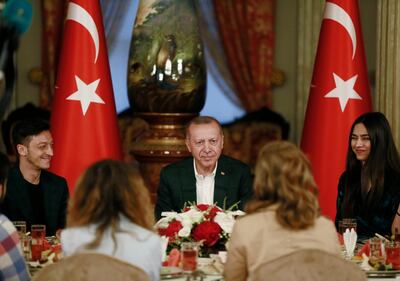Nato member Turkey is so committed to the contentious purchase of the Russian made S-400 missile defence system that President Tayyip Erdogan said it would jointly produce the S-500 system with Moscow.
US officials have called for Turkey to halt the purchase, calling the move "deeply problematic", but Mr Erdogan said on Saturday that the sale was "a done deal".
Washington has given a warning that buying the system would risk Ankara's partnership in the F-35 programme because it would compromise the jets, made by Lockheed Martin.
Washington and Nato allies that own F-35s fear the radar on the Russian S-400 missile system and the process of integrating the system into the military alliance's second-largest army will help Moscow gather critical intelligence on the stealth capabilities of the planes. There are worries that the radar systems on the S-400 system will learn to spot the $90-million (Dh330.5m) stealth jet, making it less able to evade Russian weapons.
But Mr Erdogan told a televised question and answer session with university students in Istanbul that Turkey had carried out technical work and found that such a problem did not exist.
Mr Erdogan also appeared to say that threats to exclude Turkey from the F-35 programme didn't matter, as it would be allowed to purchase the new aircraft at some point.
"They [the US] are passing the ball around in the midfield now, showing some reluctance. But sooner or later, we will receive the F-35s as well as their parts,” the Turkish leader said. “Inshallah, S-400s will arrive in our country too.”
In April, the US halted delivery of equipment needed to prepare for the arrival of the 100 Turkish-bought F-35 over Ankara’s bid to buy the Russian S-400.
"Pending an unequivocal Turkish decision to forgo delivery of the S-400, deliveries and activities associated with the stand-up of Turkey's F-35 operational capability have been suspended," Air Force Lt Col Mike Andrews, a Defence Department spokesman, said at the time.

Turkish companies were set to produce parts of the fuselage, landing gear and cockpit displays for the F-35, but Washington is reportedly looking into replacing Ankara on the production line.
In an attempt to persuade Turkey to drop its plans to buy the S-400, the United States offered the pricier American-made Patriot anti-missile system in a discounted deal that expired at the end of March. Turkey has shown interest in the Patriot system, but not at the expense of abandoning the S-400.
Responding to the US threat of sanctions, Mr Erdogan said: "It's 2019. We're not in 1974," when the US imposed a crippling arms embargo on Turkey after its military invaded northern Cyprus. Turkey believes it has valuable bargaining chips, including an early-warning radar at Kurecik, a critical part of Nato's ballistic-missile defence capabilities, and the Incirlik Airbase, close to Syria.
"There is a math of war and we've got to apply it well. We will take steps accordingly. We're just right now intensively giving necessary lessons in Syria," he said, referring to Turkish shelling of US-backed Kurdish militants in the north of the country.

